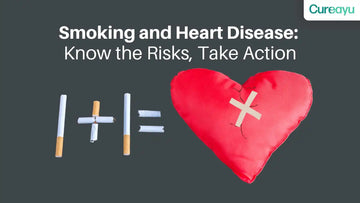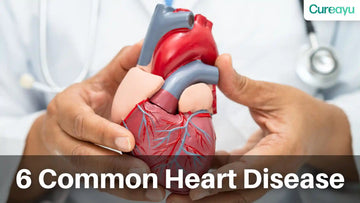Smoking is often linked with severe respiratory conditions and lung cancer, but many fail to recognize its detrimental effects on heart health. Understanding how smoking affects the heart is crucial in raising awareness about the broader implications of this dangerous habit. Cigarette smoking is an established risk factor for cardiovascular diseases, accounting for about one-third of all cardiovascular deaths.
The chemicals in tobacco not only cause major respiratory issues but also create havoc on the cardiovascular system. This problem is especially pressing given that cardiovascular diseases remain the leading cause of death globally. This blog explores in-depth how smoking leads to heart disease, the specific effects it has on the heart, and actionable tips for preventing heart disease caused by smoking.
Does Smoking Lead To Heart Disease?
The short answer is yes. Smoking contributes to heart disease in various detrimental ways. Nicotine, carbon monoxide, and other harmful chemicals in cigarettes cause damage to the heart and blood vessels. The constant exposure to these substances can lead to the buildup of plaque—atherosclerosis—which chokes off the arteries and impairs the flow of oxygen-rich blood to various parts of the body, including the heart.
Numerous epidemiological studies have elucidated a direct correlation between smoking and the development of coronary artery disease (CAD), heart attack, and stroke. Even second-hand smoking—passive inhalation of tobacco smoke—can increase the risk of developing heart disease. The more one smokes, the higher the risk of heart disease, which has a dose-response relationship, meaning the more you smoke, the greater your risk.
How Smoking Affects Heart
Plaque Buildup and Atherosclerosis
Smoking accelerates the hardening and narrowing of arteries—a condition known as atherosclerosis. This process starts when harmful chemicals in tobacco smoke cause inflammation and injuries to the blood vessel walls, leading to the buildup of fatty deposits (plaque). Over time, these plaques harden and restrict the arteries, making it difficult for blood to flow freely.
Reduced Oxygen Supply
Carbon monoxide from cigarette smoke binds with hemoglobin in the blood more readily than oxygen does. This reduces the oxygen-carrying capacity of blood, leading to reduced oxygen availability for the heart and other vital organs. A lack of oxygen supply to the heart can cause severe damage and lead to ischemic conditions.
Increased Heart Rate and Blood Pressure
Nicotine stimulates the adrenal glands to release adrenaline, which increases heart rate and blood pressure. Chronic elevation of blood pressure makes the arterial walls thicker and stiffer over time, increasing the risk of hypertension and further exacerbating cardiovascular conditions.
Formation of Blood Clots
Smoking increases the blood's propensity to clot. Platelets in the blood become more 'sticky' due to smoking, raising the possibility of clots forming within the arteries. Blood clots can lead to heart attacks or strokes by blocking the flow of blood to the heart or brain, respectively.
Smoking Effects On Heart
Coronary Artery Disease (CAD)
Smoking significantly increases the risk of coronary artery disease. The plaque buildup and narrowed arteries reduce the oxygen supply to the heart, leading to chest pain (angina) and increasing the risk of a heart attack.
Heart Attack
Nicotine and other chemicals trigger blood clot formation, which can block arteries already narrowed by plaque deposits. This blockage can cut off blood supply to part of the heart muscle, causing a heart attack.
Stroke
Chemicals in tobacco damage the blood vessels in the brain, leading to the formation of clots. This increases the risk of an ischemic stroke.
Peripheral Artery Disease (PAD)
Smoking also affects blood circulation in the limbs, leading to Peripheral Artery Disease. This condition causes pain and numbness in the limbs due to restricted blood flow.
How To Prevent Heart Diseases Due To Smoking
Quit Smoking
The most effective strategy is to quit smoking altogether. Consult healthcare professionals for personalized quit plans and consider nicotine replacement therapies to ease the transition.
Regular Exercise
Regular physical activity strengthens the cardiovascular system, improves lung function, and aids in maintaining a healthy weight.
Balanced Diet
A diet rich in fruits, vegetables, whole grains, and lean proteins supports cardiovascular health and can mitigate some of the risks posed by prior smoking.
Natural Supplements
Consider natural supplements like Cureayu Heart Tone capsules for supporting heart health. Heart Tone Capsules are the best cholesterol treatment and capsules for high cholesterol. They have a potent combination of all-natural ingredients such as Arjuna, Amla, Tulsi, Giloy, Dalchini, Garlic, Ginger, Parwal, and Gotu Kola, which have been shown to effectively lower cholesterol and triglyceride levels. Heart Tone Capsules are a renowned Ayurvedic treatment for blood pressure control. Heart Tone Capsules are a natural and comprehensive way to reduce cholesterol, maintain normal blood pressure, and improve overall cardiovascular health.
Avoid Second-Hand Smoke
Reduce exposure to second-hand smoke by avoiding environments where smoking is prevalent. Educate family members about the risks associated with passive smoking.
Regular Health Checkups
Regular health checkups can help in the early identification and management of risk factors associated with heart disease, such as high blood pressure and high cholesterol.
Conclusion
Smoking poses severe risks to heart health, but the silver lining is that these risks can be mitigated through informed choices and lifestyle changes. The journey to better cardiovascular health involves quitting smoking, maintaining a balanced diet, regular exercise, and considering natural supplements like Cureayu Heart Tone capsules to enhance overall well-being. The holistic approach to combating the negative effects of smoking on the heart can lead to a healthier and longer life.
Take the first step today by prioritizing heart health. The choices you make now can have a profound impact on your future, ensuring a healthier heart and a more vibrant life. Remember, every cigarette not smoked is a step toward a healthier heart. Be proactive, stay informed, and make heart-smart decisions.












